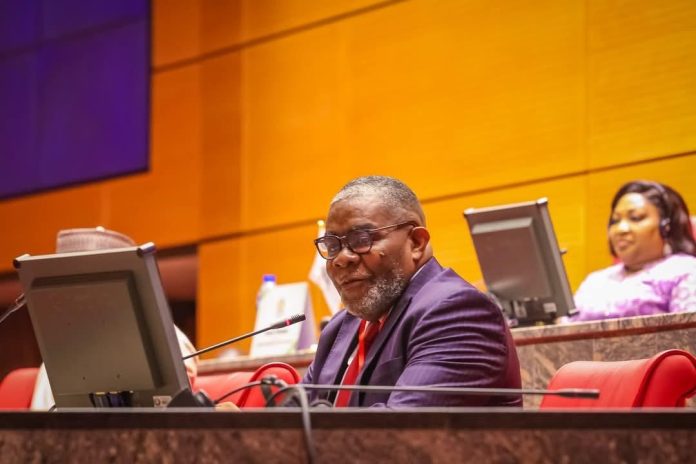By Kebba AF Touray
The ECOWAS Bank for Investment and Development (EBID) has disbursed more than $2.5 billion—approximately D144 billion—towards financing over 300 development projects across West Africa since its inception in 1999, the Bank’s Director of Research and Planning, Mr. MacDonald Saye Goanue, disclosed on Thursday. He made the remarks during an interactive session with members of the ECOWAS Parliament as part of the institution’s ordinary session held on 22 May 2025.
Mr. Goanue said the projects span critical sectors including energy, transport, health, education, and agriculture, and are central to EBID’s mandate of fostering economic integration and sustainable development across the ECOWAS region.
“Since 1999, EBID has disbursed over USD 2.5 billion for 300-plus projects, significantly advancing socio-economic development and regional convergence,” said Goanue.
He highlighted that the Bank’s financial interventions also target micro, small, and medium enterprises (MSMEs), with an emphasis on job creation, financial inclusion, and support for women and youth entrepreneurs. These efforts, he noted, are facilitated through credit lines and technical assistance designed to stimulate grassroots economic participation.
The ECOWAS Parliament, empowered under Article 27 of the Supplementary Act, plays a key role in regional oversight by holding ordinary sessions twice a year and extraordinary sessions as necessary to deliberate on urgent matters including the Community budget and the direction of ECOWAS policies. According to Mr. Goanue, these sessions are not only procedural but also instrumental in promoting accountability, citizen engagement, and alignment with broader regional goals such as ECOWAS Vision 2050.
“The Bank serves as the financial engine of ECOWAS, driving regional integration by financing projects that enhance connectivity, productivity, and inclusive growth,” Goanue told lawmakers. “This is in direct alignment with Vision 2050’s emphasis on infrastructure, resilience, and social equity.”
Driving Integration Through Infrastructure
Goanue explained that EBID gives priority to large-scale infrastructure development. Notably, the Bank supports transport and energy connectivity projects such as the West African Power Pool, as well as digital infrastructure to enhance regional competitiveness in ICT.
Among the flagship public-sector projects he cited were the electrification of rural communities through solar photovoltaic systems in Burkina Faso and Benin, the construction of a bridge connecting the AIBD TER station to Blaise Diagne International Airport in Senegal, and a 120MW thermal power station project at Maria Gleta in Benin.
In the private sector, Goanue referenced strategic investments including the establishment of a cement factory in Kagbelen by Diamond Cement Company in Guinea, an intravenous fluids factory by DO PHARMA in Togo, and a 220MW thermal power plant and fuel conversion project by the Volta River Authority in Ghana.
“These investments have contributed significantly to rural electrification, agro-industrial development, and the empowerment of local businesses across West Africa,” he said. “They are instrumental in enhancing food security, energy access, and intra-regional trade.”
Impressive Portfolio Growth
As of December 31, 2024, the Bank committed to financing 10 new projects worth UA 330.76 million (approximately USD 439.74 million) across Côte d’Ivoire, Ghana, Guinea, and Sierra Leone. Cumulatively, EBID’s financial commitments increased by 11.68 percent from UA 2.5 billion (USD 3.3 billion) for 185 operations in 2023 to UA 2.8 billion (USD 3.7 billion) for 194 operations in 2024.
Mr. Goanue said the growth reflects increasing demand for development financing and the Bank’s ability to mobilize resources efficiently to meet regional needs. He emphasized that EBID not only catalyzes investment but also de-risks projects through public-private partnerships (PPPs), encouraging private sector participation in industrial parks, logistics, and regional trade corridors.
Strategic Alignment with Vision 2050
The EBID official reiterated that the Bank’s operational focus is intricately aligned with ECOWAS Vision 2050, which outlines long-term aspirations for regional economic transformation, sustainable development, and social inclusion. “Our investments in infrastructure, health, education, and agriculture are designed to support the pillars of Vision 2050 while addressing emerging challenges such as climate shocks and post-COVID recovery,” he said.
He underscored that the Bank’s work complements the ECOWAS Parliament’s 2020–2024 Strategic Plan, which aims to build a citizen-oriented, integration-driven legislature that promotes inclusive representation and regional ownership in policymaking.
“By convening regular and responsive sessions, the Parliament provides a platform for inclusive dialogue, oversight, and effective decision-making—objectives that are central to both the Parliament and its institutional partners like EBID,” Goanue told lawmakers.
Institutional Partnerships and Governance
Goanue concluded by stating that EBID’s partnerships with national governments, sub-regional entities, and international financial institutions reinforce Vision 2050’s emphasis on strong institutions, democratic governance, and transparent resource management.
“EBID is not just a bank—it is an engine of regional stability, prosperity, and unity,” he said, noting that the institution will continue to deepen its engagement with member states and the Parliament to ensure its projects serve the people of West Africa and contribute to a more connected and resilient region.


















